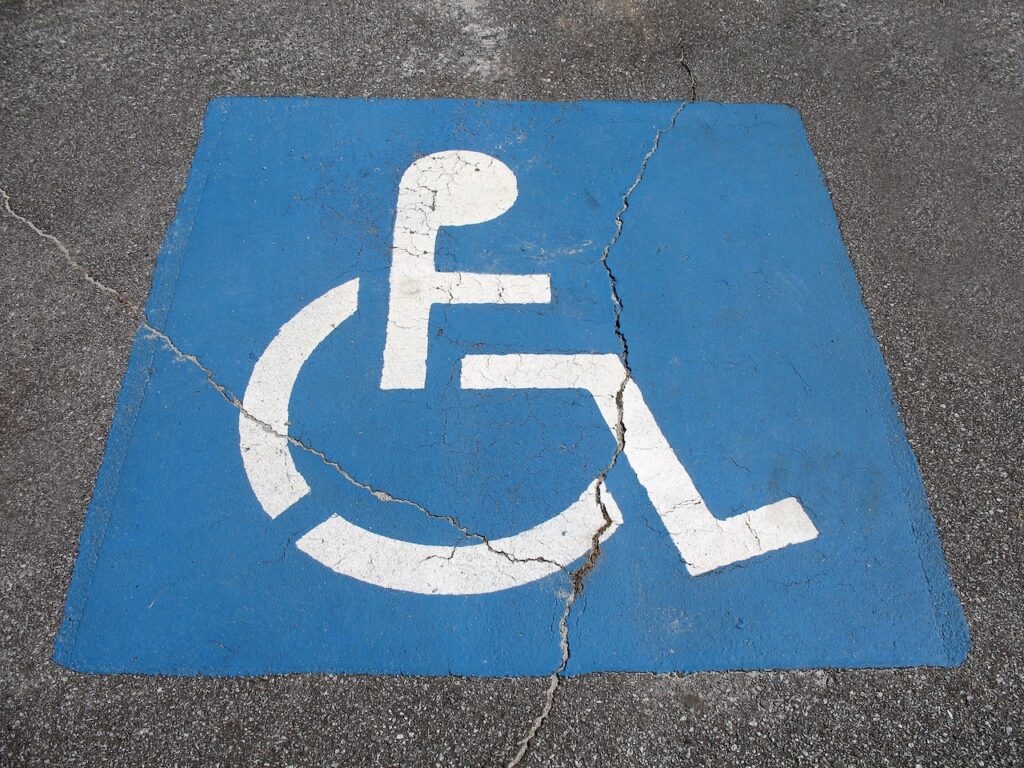Still waiting for ADA rights
Editor’s note: The following letter originally appeared on The Jersey Journal Opinion pages in 2011. The authors have resubmitted it, saying there is still “not enough access for (the) disabled.”
In 1990, George H. Bush signed the Americans With Disabilities Act and promised handicapped people they would now have the same opportunities as able-bodied people. We cried, “Freedom at last!” — but 21 (now 34) years later we’re still waiting.
My friends and I live in wheelchairs. We don’t have many choices. Those of us who drive have specially made vans with devices to secure our wheelchairs, hand controls, and a ramp to get in and out. These vans require more space than ordinary handicapped spaces. You can recognize them by their zebra stripes. This double parking space allows room for the ramp and for the wheelchair to turn when it gets off the ramp. Usually there are two van accessible spaces with zebra lines to every six or seven of the smaller handicapped spaces. The problem is anyone with a blue handicapped sticker is allowed to park in any handicapped space whether they have a walking disability or not, whether they use a wheelchair or not. Where does this leave a person with a van and a ramp?
We can’t use regular parking; we can’t even use single-space handicapped parking. We can’t go shopping, out to eat, do errands, or just normal everyday things that able-bodied people take for granted. I have a sign on the side of the van door that says, “Please do not park within eight feet, wheelchair ramp comes out,” but people read it and park there anyway.
My friends and I write to politicians, but we are ignored. Nobody seems to care about our rights.
I have a friend with post-polio, who has to move, and needs a handicapped apartment because she can’t do steps and needs a wheelchair. Where is she supposed to go?
Public bathrooms are really bad for wheelchair users. The doors are very heavy, and toilet paper and soap are up high for people who are standing. If someone is kind enough to open the door, you get in, and if they leave before you, you can be stuck in there forever!!! When I complain, the help looks at me blankly and says the bathroom passed the inspection. And I say, was he standing up or sitting down?
When you go to a concert, they put you in the back; everybody stands up in front of you and you can’t see a thing. Same price for tickets — but all wheelchairs go in the back. It doesn’t matter how much you pay.
We vote, we pay our taxes, and most of us worked all of our lives. Tear down the barriers and give us a break, please!
Mildred E. and George Bullerdick, Edgewater

People hold candles during a candlelight vigil against South Korean President Yoon Suk Yeol in Seoul, South Korea, Wednesday, Dec. 4, 2024. (AP Photo/Lee Jin-man)AP
Democracy is a shared responsibility
In the grand theater of history, South Korea has often occupied a precarious stage, teetering between the echoes of its authoritarian past and the luminous promise of democracy. Yet, the recent withdrawal of the attempted martial law in response to a groundswell of citizen resistance marks a pivotal act that deserves recognition for its poetic symmetry with the nation’s arduous journey toward self-governance, an irreversible forward momentum.
The attempt to impose martial law, though troubling, served as a catalyst for a powerful reaffirmation of democratic principles. Citizens of South Korea — students, workers, activists and even ordinary families — rose not with weapons, but with voices united in resolute opposition. Their collective action thwarted an encroachment that, in a less resilient democracy, might have quietly succeeded. This moment, then, is not merely about averting a crisis, but about showcasing the vibrant, vigilant spirit of the Korean people who have learned, through painful history, the price of silence.
We need only glance over our shoulder at the era of Presidents Park Chung-hee, Chun Doo-hwan and Kim Dae-jung to appreciate how profound this achievement is. Under Park’s and Chun’s iron-fisted rule, dissent was stifled and opposition often met with grim fates. Conversely, Kim’s struggle symbolized the indomitable will to resist tyranny. The contrast between those eras and today is nothing short of extraordinary.
That a nation once steeped in suppression could produce citizens who instinctively resist such a regression is a testament to the progress wrought by time, sacrifice and relentless advocacy for democratic ideals.
This episode also serves as a reminder to the global community. Democracy, though a fragile construct, thrives where people guard it zealously. South Korea’s citizens have shown us that democracy is not merely a system of governance but, instead, a shared responsibility, a daily labor to ensure that liberty prevails over the shadow of oppression.
To borrow the wisdom of Abraham Lincoln, democracy is indeed “of the people, by the people, for the people.” And in South Korea, the people have spoken with clarity and conviction. May this serve as an enduring lesson that even in moments of peril, the human spirit, when aligned with justice, can illuminate the darkest hours.
Igor La Manna, Seaside Heights
Send letters to the editor and guest columns for The Jersey Journal to jjletters@jjournal.com.

